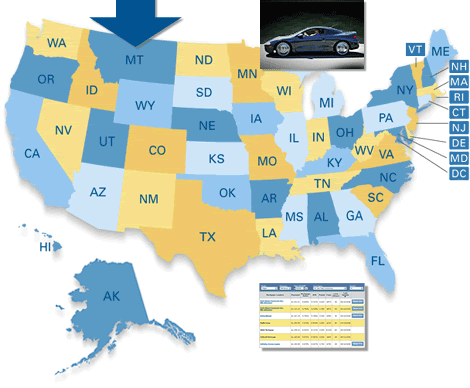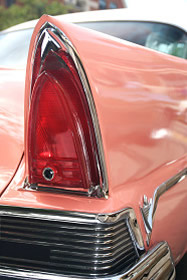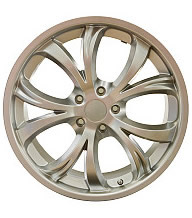Automobile Financing
Buying vs. Leasing Cars: A Comparison
by Amy Lillard
What does it mean to buy a car? And what does it mean to lease?
Buying a car means paying for the entire cost of the vehicle. Typically, you obtain a loan from the car dealership, your bank, or online brokerages. Your monthly payment consists of a portion of the loan principal, as well as interest. In addition, you are required to make a down payment and pay sales taxes upfront or as part of your monthly payment.
Leasing is often likened to renting a home, but with stricter financial responsibility. When you lease a car, you pay for a portion of the vehicle's cost. Your monthly payments consist of depreciation over the month, as well as finance charges levied by the dealership. With many leases, you can opt out of a down payment, and sales tax is included as part of your monthly payment.
New and Used Auto Loan Rates
Choose Your State Below

Start by selecting your state
Each method of obtaining a car has distinct advantages and drawbacks, and each is appropriate for specific types of drivers.
Buying
Ideal Situation: If you plan on driving and maintaining your vehicle for more than five years, buying is the better option.
Benefits:
• Equity: When you purchase a car with financing, you gain equity in that purchase. This equity can be used as collateral for other purchases, and as a general boost for your credit score.
• Unlimited Use: You can use your car as much or as little as you need, with no restrictions on yearly mileage or maintenance. You can modify your car as needed, including paint jobs, stereo installation and other modifications.
Drawbacks:
• Higher initial and monthly costs: When purchasing your car with a loan, you will be responsible for a down payment, and often-hefty sales taxes. Your monthly payments will also be larger due to the need to pay principal and interest.
• Depreciation: While you are able to build equity in your car through monthly payments, depreciation can significantly decrease the value of your car. In the first years after you purchase your car, most new vehicles depreciate 20 to 40 percent. Depreciation, combined with interest-heavy monthly payments, may translate to little equity built up in your car.
Leasing
Ideal Situation: If you look to keep your car for a short time (up to 48 months) and keep your yearly mileage under approximately 15,000 miles, leasing may be a more flexible and affordable option of car “ownership.”
Benefits:
• Lower initial and monthly payments: A car that you might not be able to afford with monthly principal and interest payments can be much more affordable under a lease option. Since you pay only for the portion of the car you use, payments can be as much as 30-60 percent lower than loan repayments. Additionally, many leases do not require down payments and other upfront costs.
• Less Cost in Upkeep: Leasing a car may mean less money spent towards upkeep, as most lease terms coincide with warranty coverage.
• Tax Benefits: Many drivers looking for a car for business purposes may find higher tax deduction ability with leases.
Drawbacks:
• No Equity: You are not building equity with monthly “rent” payments, and you may have to pay more in insurance.
• Penalties: If you decide to end the lease term early, you will incur significant penalty. If you drive more than the mileage allowed by your lease contract (usually around 15,000 miles a year), you will incur high charges on additional miles (typical fees are $0.15 a mile).
New and Used Auto Loan Rates
Choose Your State Below

Start by selecting your state
Learn more about the problems and opportunities presented with automobile purchasing and financing with our continuing series, including steps to buying new and used cars, financing options, types of loans and leases, and more.
 A frequent contributor to ERATE® since 2006, Amy Lillard is a freelance writer specializing in turning complex information into useful tips and tricks for readers. For questions or topic suggestions, contact Amy at [email protected].
A frequent contributor to ERATE® since 2006, Amy Lillard is a freelance writer specializing in turning complex information into useful tips and tricks for readers. For questions or topic suggestions, contact Amy at [email protected].
Other related articles:
Buying a Car: Standard and Extended Warranties
Buying a Car: 5 Steps to Find the Perfect Vehicle
Shop harder for loans for gas-sipping used cars
Auto Loans Advice: New Cars & Used Cars

Automotive Loans: Trading in a Car
Automotive Loans: What Laws Protect Car Buyers?
Automotive Loans: Trade In or Sell a Car?
Automotive Loans: Is Zero Percent Financing Really Possible?
Automotive Loans: Determining a Down Payment
Automotive Loans: The Truth About "Add-Ons"
Automotive Loans: Top 5 Mistakes When Buying a Car
Automotive Loans: Shopping Online
Automotive Loans: Dealer Incentives to Buy
Automotive Loans: Car Buying Incentives
Automotive Loans: Should You Buy New or Used?
Automotive Loans: What to Know About Interest Rates
Automotive Loans: Negotiating a Loan with a Dealer
Automotive Loans: How Much Car Can You Afford?
Automotive Loans: Understanding Typical Loan Language
Automotive Loans: Types of Financing
Automotive Loans: Buying Vs Leasing
Automotive Loans: Applying for a Car Loan

Buying a Car: Standard and Extended Warranties
Car Buying: Financing Background and Steps
Leasing a Car: Two Types of Leases - Closed & Open
Buying a Used Car: Two Options
Buying a Car: 5 Steps to Find the Perfect Deal
Automobile Buying/Financing

5 Steps to Find the Perfect Car
Auto loan defaults to rise 7 percent in 2010
Auto Show Season Tips for Buyers
When is the Best Time to Buy a New Car?
Making a Vehicle Purchase? Enjoy These Helpful Tips
Chances are, your next car will be used. Drive a hard bargain
What your car is really saying
2012 President's Day auto sales among best ever
Special Report: Hitting the Brakes on Auto Dealer Loans
Auto Insurance
Buying Ins - Shopping for Insurance
Best Car Insurance Plan for You


